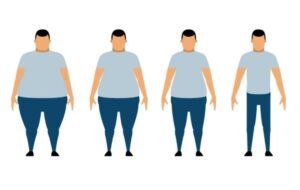Obesity

Overview
Obesity is a disease where one has excessive body weight. Excessive body weight can lead to severe conditions like type 2 diabetes, heart disease, high blood pressure, etc. It can also affect one’s mental health since it restricts the patient’s physical movement in severe cases. Usually, a good diet and exercise are generally sufficient to lose a good amount of weight. However, in cases where this isn’t possible, doctors may suggest bariatric surgery.
Types
Obesity can be classified as:
- Class I obesity: Anybody with a BMI of 30 to <35kg
- Class II obesity: Anybody with a BMI of 35 to<40 kg
- Class III obesity: Anybody with a BMI of 40+kgs
Causes
Several causes could lead upto obesity. Some of them are:
- Excessive consumption of junk food
- Excessive consumption of sugary food
- Lack of physical activity and movement
- Being stuck to screens while consuming food
- Binge eating due to mental illnesses like depression, anxiety, etc
- Certain hormones cause obesity too
- Medications like antidepressants are known to cause obesity
- Specific physical disabilities can increase the risk of becoming obese
Symptoms
People with obesity may notice the following symptoms:
- Severe pain joints
- Excessive and loud snoring
- Visibly excessive fat
- Sweating constantly
- Fatigue
- Shortness of breath
- Sleep apnea
- Stretch marks, especially on the back and hips
- Dislocated hips or flat feet
- Constipation
- Your BMI is more than 40
- Your BMI is 35 or more, and you have type 2 diabetes and high blood pressure
Diagnosis
There are several tests conducted to diagnose obesity. Some of them are:
- Physical exam: Here, the candidate’s blood pressure, heart rate, and temperature are checked. The height and weight of the candidate are also measured. A thorough examination of the abdomen may be conducted too.
- Health history: Your health history will be reviewed. Information regarding previous weight loss efforts, medications, stress, diet, control of appetite, etc., may be asked for.
- Calculation of BMI: Your BMI will be calculated to make an appropriate diagnosis.
- Health problems: An assessment of obesity-related health problems will also be made. Candidates may be checked for high blood pressure, diabetes, high cholesterol, and liver problems.
Treatment
Obesity treatment may include particular lifestyle and dietary changes. Some of them are:
- Avoiding junk and opting for healthier nutritious food options like green vegetables
- Restricting the consumption of sugary drinks like sodas
- Replacing one or two meals with low-calorie drinks like smoothies
- Exercising regularly
- Opting for counseling to help you through your weight loss journey
- Joining support groups to keep you on track
- Consumption of specific weight loss medications
- Procedures like endoscopic sleeve gastroplasty and intragastric balloon
- Weight loss surgeries like gastric bypass surgery and adjustable gastric biHealthcareth care officials might also recommend treatments like hydrogel, gastric aspirate, and vagal nerve blockade.
Prevention
You can reduce the risks of contracting obesity by:
- Increasing your physical activity
- Switching to a healthy, nutritious diet
- Improving your sleep schedule
- Reducing your levels of stress
- Avoiding sugary foods and beverages
Obesity can take a toll on one’s physical and mental health. With determination and commitment to exercising and maintaining a balanced diet, one can become healthy without requiring surgeries or medications. Contact your doctor immediately if you feel you fall under the obese spectrum.
